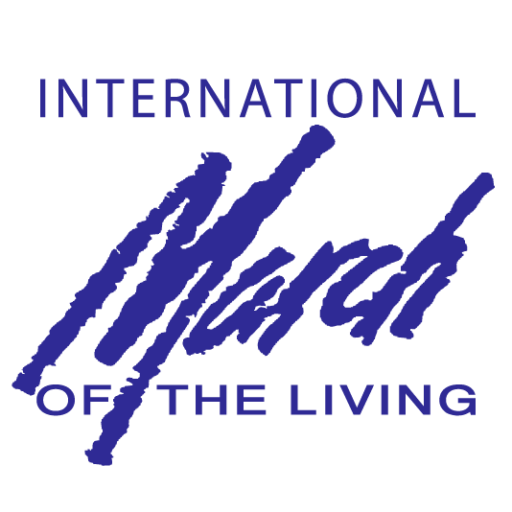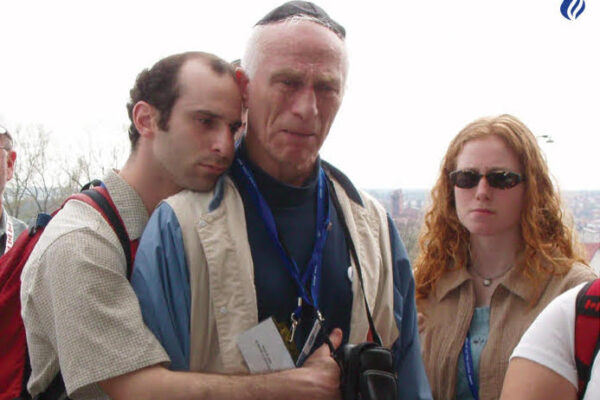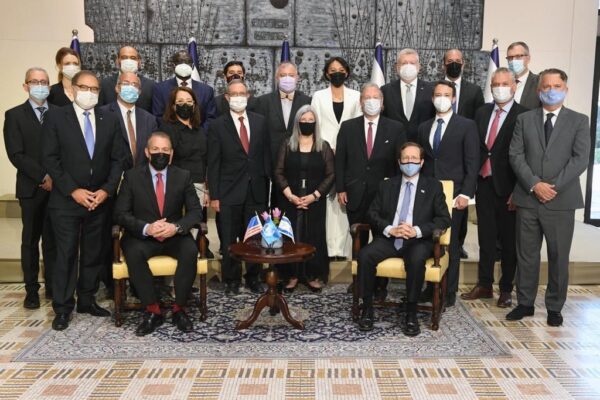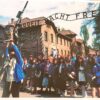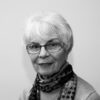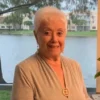Holocaust survivor Allan Hall had to wipe tears away while sharing his testimony with educators at the UM Holocaust Teacher Institute. (Staff photo/Beth Black)
90 teachers from throughout Miami-Dade County recently received a Holocaust lesson.
The teachers learned different ways to incorporateShoah studies into their teachings from a variety of speakers during the annual week-long University of Miami Holocaust Teacher Institute.
Miriam Klein Kassenoff, director for the institute, noted “I say it ever year, but this particular group is really in my mind exceptional and from the first day, there was no hesitation in interacting with the scholar speakers as they asked very intelligent questions and had very intelligent comments.”
“That is something unique because usually it takes teachers a couple of days to feel safe enough to say something, but Monday within five minutes, [United States Holocaust Memorial Museum historian] Dr. William Meinecke said “any questions, and there were questions, answers and comments from the group.”
Some of the numerous speakers during the institute included Kassenoff, who provided her testimony on when she fled Nazi-occupied Europe in 1941 as a young child with her parents and infant brother, the late Judge Ted Klein; noted Holocaust scholar Michael Berenbaum; Mary Johnson, senior historian of the educational and professional development organization Facing History and Ourselves and Lesly Culp, senior content specialist and trainer for IWitness, the University of Southern California Shoah Foundation’s educational platform.
The institute also included Holocaust survivors David Mermelstein and Allan Hall, who both live in Miami, provide their testimonies of survival in a moving and powerful interview conducted by Kassenoff in front of the teachers. Both shared their harrowing accounts while answering questions throughout this solemn session to teachers keen on hearing their stories. The survivors, who were children at the time the Holocaust began, provided emotional accounts of what their families went through and even shared what life was like for them before the Shoah. One of the striking moments from this session included Mermelstein’s sad recollection of the last time he saw has parents and his explanation of when he felt he would never see them again.
In an interview with the Jewish Journal, Mermelstein, an Auschwitz survivor who has shared his testimony in past years, said regarding the institute: “This program is very important because they [the teachers and their students] are the future and we are the history.”
Hall, who was also joined with his brother Andrew, chair for the Holocaust Memorial Miami Beach, during his testimony told the educators that each one of them can reach thousands of students in sharing these stories and thanked them for being there and thanked Kassenoff for the opportunity to speak.
Teachers commented on these survival testimonies.
Ron Green, a teacher at Miami Southridge Senior High School, said: “It’s very emotional because I’ve taught the Holocaust but I personally never met a gentleman like David or Allan that were in the Holocaust.”
Kathy Pham, a teacher at Hebert O. Sibley K-8 Academy in Miami, said: “It’s interesting and emotional. I’ve heard survivors speak before but I’ve never heard them speak about their experiences as children. That was something new and different for me to hear about.”
Other teachers commented about the institute’s impact on them.
Ronnit Branciforte of Bowman Ashe/Doolin K-8 Academy in Miami, said: “To me this is the finest professional development that we have in all of Miami-Dade County Public Schools. I think the quality of the speakers that are brought to the institute to teach is amazing.”
Ileana Vila, a teacher at Miami Palmetto Senior High School, called the institute “thought-provoking.”
“It’s made me think of what’s been happening recently and how we need to try to do our best to teach tolerance and get our students to think more about what others go through or have gone through,” she added.
UM’s School of Education & Human Development, The Sue and Leonard Miller Center for Contemporary Judaic Studies, The School of Business Administration, WLRN, Targum Shlishi, the Holocaust Memorial Miami Beach and Facing History and Ourselves together with Miami-Dade Public Schools’ Department of Social Sciences presented the institute.
Originally published HERE
